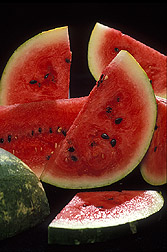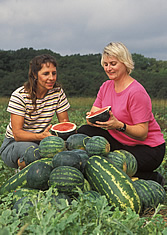This page has been archived and is being provided for reference purposes only. The page is no longer being updated, and therefore, links on the page may be invalid.
Watermelon Serves Up Medically Important Amino Acid
By Erin PeabodyMarch 21, 2007
Nothing says you care like the gift of a small watermelon. At least that's the custom in China, where the offer of this red-fleshed cucurbit is considered a fine way to please a gracious host or ill friend.
Now scientists with the Agricultural Research Service (ARS) have found that there's far more to this gastronomic gesture than just tradition and good taste. In addition to containing plentiful amounts of the health-promoting antioxidant lycopene, watermelon is an excellent source of the amino acid citrulline.
And ARS researchers in Lane, Okla., and their collaborators have found that not only are watermelon's citrulline stores abundant--they're also readily usable. Their findings are reported in the current issue of the journal Nutrition.
The human body uses citrulline to make another important amino acid—arginine—which plays a key role in cell division, wound healing and the removal of ammonia from the body.
ARS plant physiologist Penelope Perkins-Veazie and nutritionist Julie Collins were interested in finding out just how bioavailable watermelon's citrulline is, since the fruit is one of few foods to contain high levels of it. Perkins-Veazie works at the ARS South Central Agricultural Research Laboratory in Lane, while Collins—previously based at the Lane laboratory—works at Eastern Oklahoma State College in Wilburton.
The two collaborated with amino acid expert Guoyao Wu at Texas A&M University in College Station.
After analyzing the arginine levels of volunteers who'd recently consumed differing amounts of concentrated watermelon juice, the scientists determined that ingesting the juice increased the volunteers' levels of plasma arginine—likely from conversion of citrulline.
Medical researchers are currently evaluating arginine as a possible treatment for high blood pressure, elevated glucose levels and the vascular complications associated with sickle-cell disease.
If such studies pan out, concentrated forms of watermelon could represent an all-natural amino acid source. The fruit's good-for-the-body lycopene is an added bonus.
Perkins-Veazie is now focused on finding an optimal way of extracting citrulline from watermelon.
ARS is the U.S. Department of Agriculture's chief scientific research agency.


